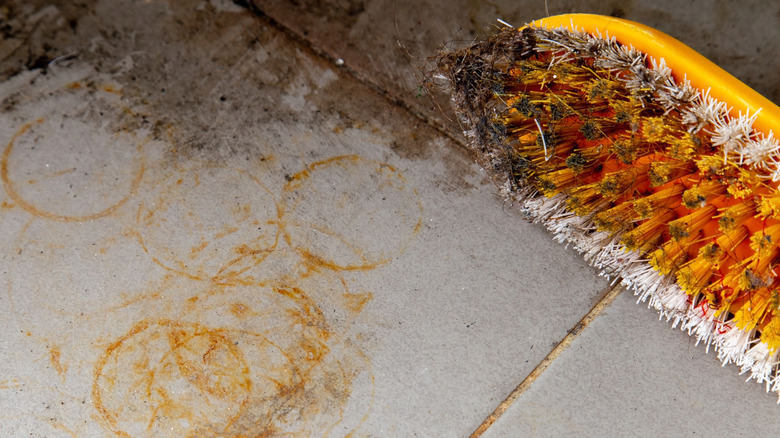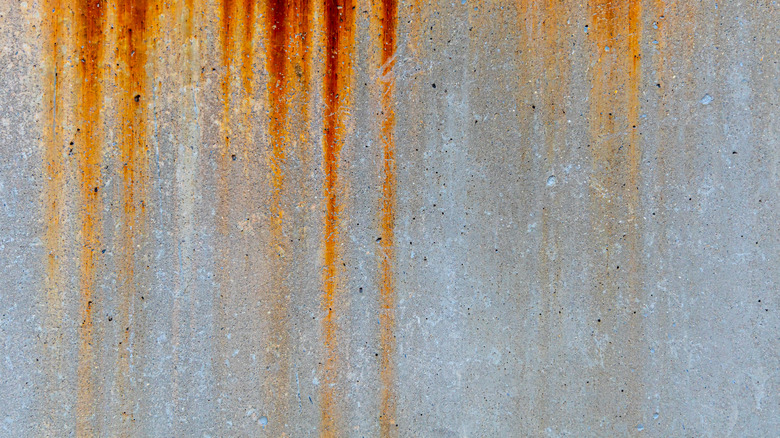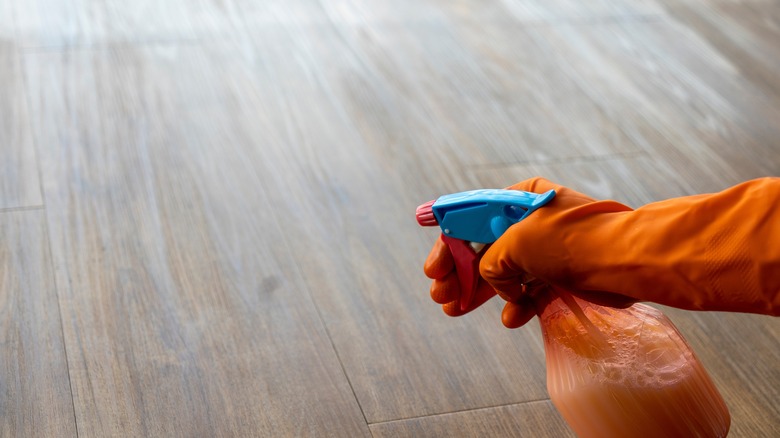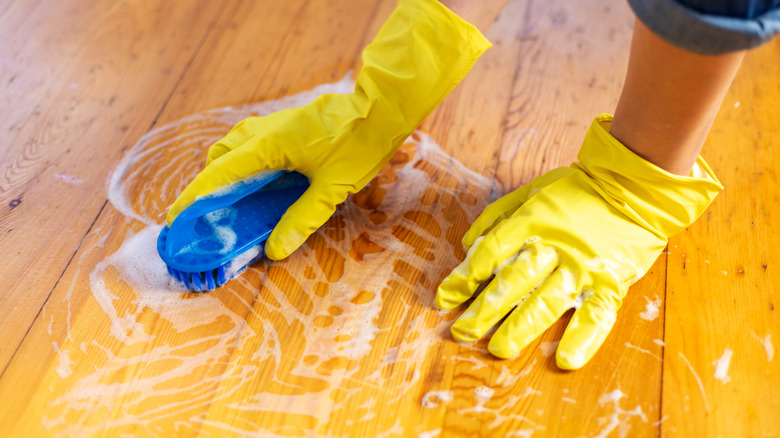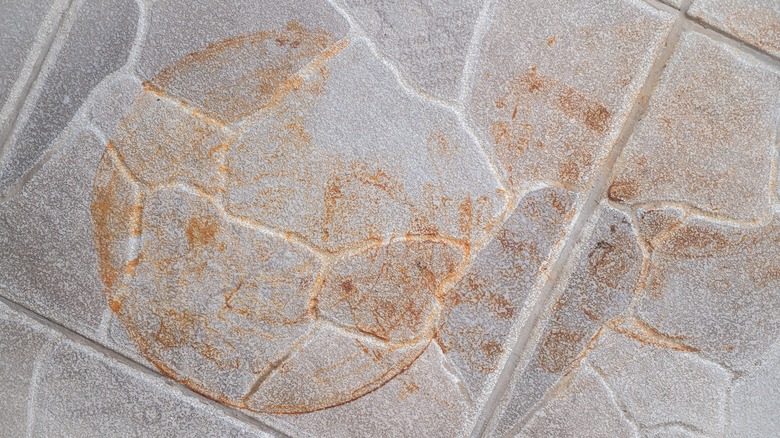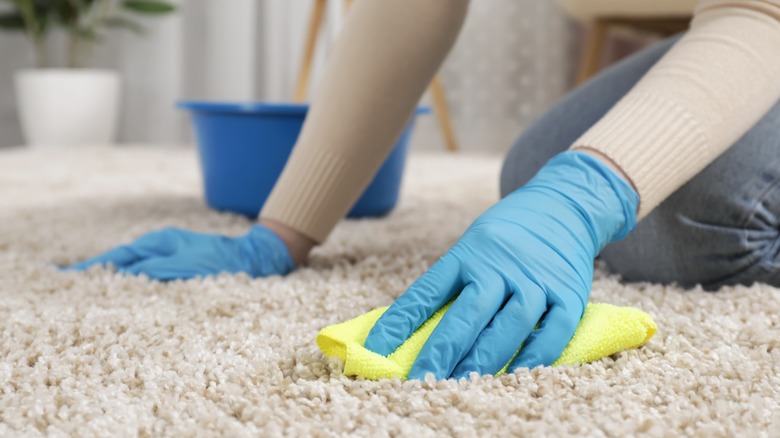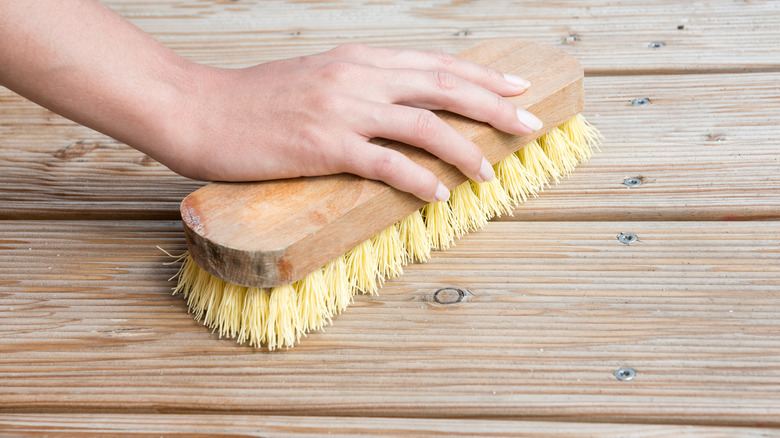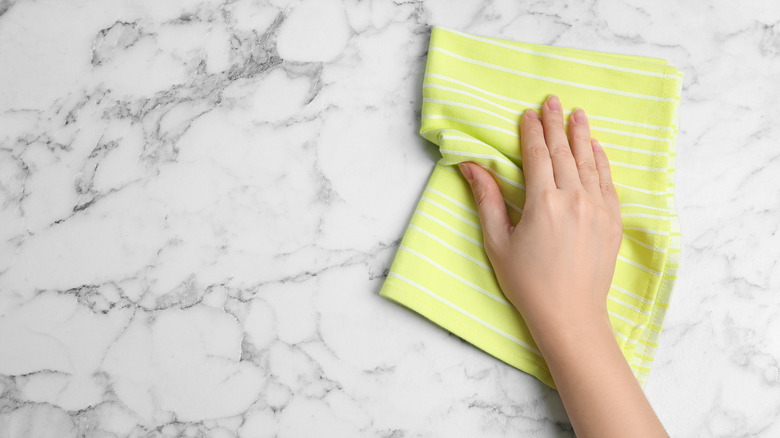7 Tips And Tricks To Remove Rust Stains From All Types Of Floors
Rust can get onto any flooring type, whether due to a leaky, corroded pipe or a metal object that's come in contact with moisture. Sometimes, these stains can go undetected, sitting out of sight under the rust source until you move it. Unfortunately, the longer it goes unnoticed — and the longer the offending object sheds iron oxide — the more time rust particles have to penetrate the surface. The depth to which the stain penetrates depends on the surface porosity — larger and deeper pores in a material have more room to accommodate rust particles. This means that highly porous flooring materials, like hardwood, carpet, and marble, can get some stubborn stains from rust. But there's good news: Regardless of the flooring type and the stain severity, a few tricks involving commonplace household items can get some of these stains out.
The ideal rust removal method depends on the flooring type. That's because some flooring materials respond well to specific cleaning agents, while others don't. In fact, popular cleaners like vinegar and lemon juice can even damage certain floors. Below, we explain which methods, tips, and tricks work best for all the most common types of floors.
Lemon juice and vinegar work great at scrubbing rust out of concrete floors
Concrete floors are susceptible to rust stains given their typical location in garages, utility rooms, and outdoor areas. These parts of the home often house metal objects — think outdoor shelving, patio furniture, grills, landscaping tools, and gas tanks. And, alas, we often let the elements go to work on these items as they face frequent soakings from rainfall and the water hose. Over time, rust builds up and penetrates the concrete floor. Concrete's porous composition doesn't help, as leaching iron oxide works its way into all the nooks and crannies of the surface. But, luckily, rust stains may come off the concrete with the help of a DIY trick that employs a few common household ingredients. Lemon juice and vinegar are two excellent options to try — their acidic content turns iron oxide (rust) into a water-salt solution you can rinse off easily. Coca Cola will also work in a pinch. The beverage contains phosphoric acid, which also breaks down rust oxide.
The rust removal procedure is similar whether you're using lemon juice, vinegar, or Coke as the cleaning agent. First, clear the stained surface of any grease or debris to help the cleaning solution go deep into the rust-containing pores. Next, soak the affected area with the liquid of choice and leave it for 10-15 minutes. Now, take a hard-bristled brush to the stain and try to scrub out the rust particles. Finally, wash the rust away with a soap and water mixture.
Use baking soda, vinegar, and water to remove rust from vinyl flooring
Vinyl is an incredibly popular flooring finish, mostly because it mimics the aesthetics of higher-end flooring finishes at a lower cost. What's more, you can maintain vinyl flooring in peak shape with little effort to maintain, as it's resilient to wear. However, like other types of flooring, vinyl is not entirely immune to getting rust stains. The good news is that a few pantry items should lift the stains right off of vinyl. These stains need two ingredients to come off: baking soda and vinegar. The baking soda oxidizes the iron oxide before the acetic acid in vinegar detaches it from the surface, leaving you free to scrub the stain off.
Before you start, assemble the basics — baking soda, vinegar, water, and a sponge or rag. Mix the soda with a bit of water to produce a paste on top of the stain. Rub this into the stained area with the sponge. Then, spray or pour vinegar on top and scrub the stain until it loses its hold on the vinyl. Finally, rinse the dirty mix off with water. Now, a few words of caution. First, don't use hard-bristle brushes on vinyl, as these can scratch its surface. If the sponge isn't abrasive enough, use a mild-bristled brush instead. Also, don't pour too much water onto the floor — it could get underneath the planks and cause damage. You don't want the rust removal project to end in new vinyl flooring installation!
Neutral pH cleaner and isopropyl alcohol fight rust stains on hardwood floors
Hardwood flooring appeals to folks because its rustic, visually pleasing appearance imbues the home's interior with a bit of nature. But their wooden composition is porous. This porosity gives rust particles an easy route deep into the pores of the wood — and leaves you with a challenging stain. Harsh chemicals — whether basic or acidic — and abrasive cleaning pads are a no-no, because they can damage the wood and its finish. Even cleaning favorite, vinegar, should not be used to clean hardwood floors because it could etch the surface. Instead, the way to get rust out of a wooden floor is to use a cleaner with a neutral pH, along with a bit of isopropyl alcohol.
Start by blotting stained wood with a water-soaked rag — the rag should pick up much of the looser rust. Next, wipe the area with a dry rag. No loose rust particles should be left at this point, so the stain you're left with is what's gotten into the pores. To treat it, use a neutral pH cleaner like this one from Home Depot. The stain should be less visible now, but if it's not completely gone, it's time to bring out the isopropyl alcohol. Pour a bit of the liquid onto the remaining stain and give it a minute before scrubbing the area with a soft-bristle brush. Once the stain is gone, treat it one more time with the neutral pH cleaner and wipe it with a dry cloth.
Lemon juice and salt do wonders on stained porcelain and ceramic tiles
Porcelain and ceramic tiles often grace the floors of kitchens, bathrooms, mud rooms, and other high-traffic parts of the house. These are the areas that often contain metal appliances, shelving units, and other potential sources of rust stains. Porcelain tile is less susceptible to deep rust staining than ceramic because it's less porous, so the rust particles generally stay on the surface where they're easy to wipe off. That said, whether you have porcelain or ceramic tile, both may get stubborn rust stains — especially if you've been oblivious to the source of rust and it's had time to seep into the tile. The good news is that lemon juice and salt can help you remove some of these smears without the need for heavy, chemical-filled cleaners. Salt is an abrasive substance that loosens the rust stain, while the acid in the lemon juice helps to break down rust particles. Vinegar is an alternative to lemons, although its constituent acetic acid is weaker than the citric acid found in lemon juice.
The first step in your rust-vanquishing quest is to soak the stains with lemon juice. You should let the citric acid do its work unbinding the iron oxide particles from the tile's pores — 10 minutes or so should suffice. Next, sprinkle some salt onto the surface and scrub the area for a while with a sponge. The salt should extract the detached bits of rust and make it easy for you to wipe them off.
Water and dish soap can help get rust stains out of carpet flooring
If you uncover a rust stain on the bedroom carpet, you may think that the entire carpet is doomed because nothing can get the rust out of its fibers. You're right to worry — carpets are highly permeable, and their strands do a frustratingly good job of absorbing stains of all kinds. But don't despair — there are several DIY methods for removing rust from carpets. The simplest one involves dish soap and water as the cleaning agents. However, you also need to free the iron oxide bits stuck in the carpet's strands. For this, a butter knife will do the trick.
Begin by abrading the dirty area with the knife's sharp end. Be gentle — you don't want to accidentally give the carpet's strands a shave. Next, pour some dish soap onto a rag and pat the stain until rust starts appearing on the rag. Don't try rubbing the stain, as doing so will smear the rust particles around. If this method fails to get all of the rust out completely, try pouring a bit of lemon juice and sprinkling salt on the stain. After several hours of sitting there, the mix should help lift the remaining rust bits out.
Soapy water can do away with rusty stains on your deck, but you may need to sand it first
Like concrete, decks are notoriously susceptible to rust because they're exposed to moisture year-round and are often home to metal, such as barbecues and furniture legs. Pressure-treated wood, cedar, and redwood are some of the most commonly used and high-grade decking materials, but all of these have some degree of porosity. This means that rust can penetrate the boards' surface and make a home deep in the wood's pores. The depth of rust penetration will determine how you lift the stain. If it's relatively superficial, soapy water and a brush may be all you need to get the rust out. But if the iron oxide has permeated far beneath the surface, you may have to sand the stain.
The soap and water method is really simple. Mix dish soap with water, and pour the solution on the stain. Next, use a brush with medium bristles to work away at the stain. Hopefully, the rust comes out with a bit of effort. If the stain refuses to budge, use sandpaper to abrade the surface and get at the entrenched bits of iron oxide. Note that this method will remove the deck finish, so you may have to re-stain the affected area afterward.
You'll need poultice to remove rust from marble floors
Marble is a resplendent material thats beauty commands a high price — for example, you'll pay at least two or three times more for marble flooring than you would for porcelain. So, it's understandable if finding a rust stain on your marble floor causes you to panic. Alas, marble does stain easily due to its porosity. Even water can stain the stone, let alone rust. In fact, rust stains on marble are notoriously stubborn, and sadly, you can't use acid-based cleaners like you would with other surfaces, as they can etch the tiles. That said, homemade poultice may give you a chance to do away with the stain on your own, without splurging on professional help. Poultice is a mixture that comprises a solvent — like hydrogen peroxide — and a paste made from baking soda and water. This mixture helps extract the rust particles from the marble.
To prepare the poultice, mix hydrogen peroxide, baking soda, and water until you have a paste with a thick consistency. Then, apply the poultice onto the affected area and cover it with plastic wrap. This remedy needs time to work, so don't disturb the poultice for up to two days. Finally, gently remove the caked-on paste from the marble, taking care not to damage the surface in the process. At this point, the poultice should've absorbed all traces of the iron oxide from the stone.
